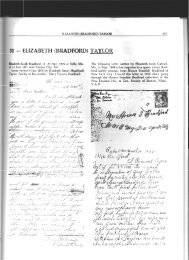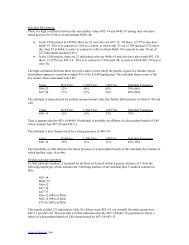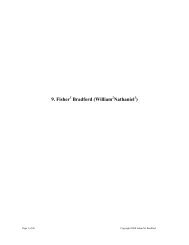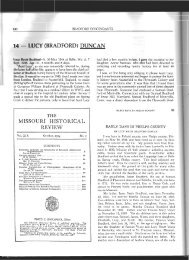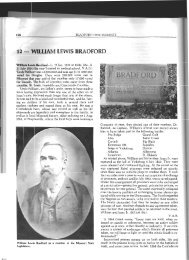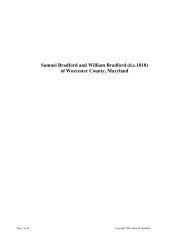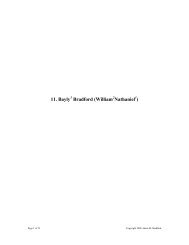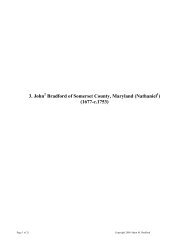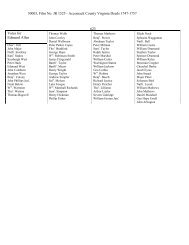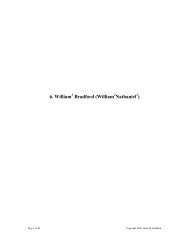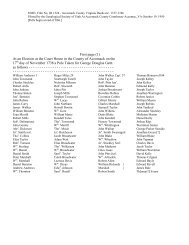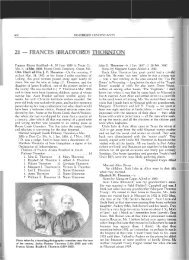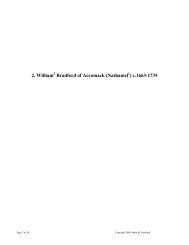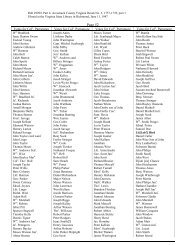1. Nathaniel Bradford of Accomack County, Virginia - Lower ...
1. Nathaniel Bradford of Accomack County, Virginia - Lower ...
1. Nathaniel Bradford of Accomack County, Virginia - Lower ...
You also want an ePaper? Increase the reach of your titles
YUMPU automatically turns print PDFs into web optimized ePapers that Google loves.
Mathews’ lack <strong>of</strong> payment for certain items he had purchased from the tribe. When the colonists executed<br />
their own raid in retaliation they killed some Susquehannock as well as Doeg, and in revenge for this attack<br />
the Susquehannocks began to conduct raids against the colonists, and to involve allied tribes. The war grew<br />
more serious, and the threat to the inhabitants <strong>of</strong> the outlying regions was real. In an effort to make peace,<br />
Governor Berkeley set up a meeting between the colonists <strong>of</strong> the Northern Neck and the Susquehannocks<br />
in which several tribal chiefs were murdered, leading to more mistrust and anger on both sides, and more<br />
violence. In an attempt to control the situation, the government made efforts both to restrain the colonists<br />
and to pacify the Indians. In March 1676, the Assembly declared war on certain tribes and set up a military<br />
zone on the border; it also passed laws regulating trade with the Indians, probably in an effort to prevent<br />
events like the one at Mathews’ plantation which could so easily spiral out <strong>of</strong> control. To many colonists<br />
these measures seemed an onerous burden which had nothing to do with the fight against the Indians. All<br />
men probably felt the sting <strong>of</strong> the higher taxes which were necessary to support the colony’s heightened<br />
state <strong>of</strong> defenses. And those residents <strong>of</strong> the outlying areas who felt the brunt <strong>of</strong> the Indian incursions must<br />
have wondered what good any laws, taxes or regulations were which failed to protect them. A source <strong>of</strong><br />
particular bitterness was the fact that William Berkeley and many other leaders <strong>of</strong> the colony had a great<br />
personal stake in the Indian trade, a fact which led some to allege that the government’s regulation <strong>of</strong> the<br />
Indian trade was effected more from a desire for material gain than in the spirit <strong>of</strong> a wise policy.<br />
The point normally fixed as the beginning <strong>of</strong> the rebellion is the moment when <strong>Nathaniel</strong> Bacon, a recent<br />
immigrant and member <strong>of</strong> the governor’s council, took command <strong>of</strong> an extralegal militia <strong>of</strong> volunteers.<br />
These men had determined to fight the Indians themselves since they felt the protection <strong>of</strong> the regular<br />
colonial forces to be insufficient, and they elected Bacon their leader. Bacon quickly took action with this<br />
force against the Pumunkeys, a tribe living near his own estates, and promised more action to come. To<br />
subdue Bacon’s extralegal army Berkeley rode personally to Bacon’s headquarters with a troop <strong>of</strong><br />
horseman, but Bacon was able to flee with his men before Berkeley’s arrival. The Governor declared<br />
Bacon a rebel and removed him from the Council, at the same time promising a new election <strong>of</strong> burgesses<br />
to the Assembly in order to air and settle all grievances. Bacon himself, popular with his neighbors thanks<br />
to his exploits, was elected to the Assembly for this session, but instead <strong>of</strong> being allowed to sit with the<br />
burgesses he was captured. After his capture, Bacon acknowledged the error <strong>of</strong> his ways and for such<br />
contrition was reinstated to the council. He then absented himself for most <strong>of</strong> the sessions <strong>of</strong> the Assembly<br />
which followed. However, near the end <strong>of</strong> the Assembly’s term Bacon reappeared in Jamestown with a<br />
troop <strong>of</strong> 500 men and forced the burgesses to give him command over the government’s forces being raised<br />
against the Indians. This the Assembly did and, having apparently gotten what he came for, Bacon departed<br />
to wage war. However, while on campaign Bacon learned that Berkeley had again declared him a rebel and<br />
was plotting his capture. Speedily Bacon returned to the Capital with his men to confront the Governor, but<br />
when he arrived found that Berkeley had fled to the eastern shore, which now became a kind <strong>of</strong> capital <strong>of</strong><br />
the government-in-exile.<br />
Page 41 <strong>of</strong> 74 Copyright 2008 Adam M. <strong>Bradford</strong>



